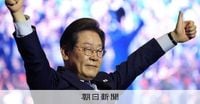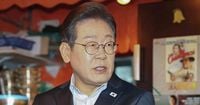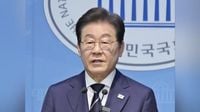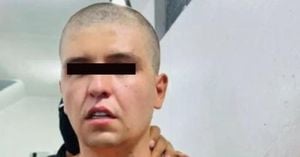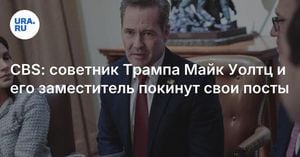On May 1, 2025, South Korea's Supreme Court issued a significant ruling that has thrown the presidential campaign of Lee Jae-myung, the leading candidate from the opposition 'Together Democratic Party', into turmoil. The court overturned a previous not guilty verdict from the Seoul High Court concerning allegations of violating the Public Office Election Act by making false statements during his campaign for the 2022 presidential election.
This unexpected judicial decision comes just weeks before the presidential election scheduled for June 3, 2025, where Lee was widely anticipated to emerge victorious following the dismissal of President Yoon Seok-yeol. The Supreme Court has now sent the case back to the High Court for retrial, indicating that the legal challenges facing Lee are far from over.
Lee, who previously served as the mayor of Seongnam, was originally convicted in November 2024 by the Seoul District Court, receiving a sentence of one year in prison, suspended for two years. This conviction stemmed from accusations that he made false statements related to urban development allegations during his 2022 campaign. However, the Seoul High Court reversed this decision in March 2025, declaring him not guilty, which led to the prosecution's appeal.
In a rapid sequence of events, the Supreme Court deliberated the case with unusual speed, beginning hearings on April 22, 2025, and issuing its ruling just a few weeks later. The court's decision on May 1 found that some of Lee's statements constituted the public announcement of false facts, indicating that the High Court had misinterpreted legal principles in its earlier ruling.
Lee, who has consistently led in opinion polls, expressed disappointment with the Supreme Court's ruling, stating, "This is completely different from what I had thought." Following the verdict, he maintained that the will of the people is paramount and pledged to continue his campaign for the presidency.
The 'Together Democratic Party', which has been rallying support around Lee, reacted strongly against the Supreme Court's decision, labeling it an unjust intervention in the upcoming presidential election. The party had recently established a central election strategy committee to strengthen its campaign efforts, but this ruling has raised doubts about their momentum.
Public sentiment appears to be shifting as well. A recent survey conducted by the polling company 'Fairness' revealed that 42.7% of respondents identified Lee as the most untrustworthy politician, a sentiment that could complicate his campaign. As the legal proceedings unfold, there is speculation about whether calls for Lee to step down as the candidate might intensify, particularly if public opinion continues to sour.
Meanwhile, the ruling conservative party, 'People Power', has seized on this opportunity to pressure Lee, asserting that he must take responsibility for his alleged illegal actions. They are expected to nominate their own candidate in the upcoming party convention, further complicating the electoral landscape.
In the event that Lee is ultimately found guilty in the retrial, he faces the possibility of losing his eligibility to run for president due to the nature of the charges. If the High Court issues a guilty verdict of 1 million won or more, Lee would be disqualified from the election. However, legal experts suggest that it is unlikely a final decision will be reached before the June elections.
The Supreme Court's ruling has not only increased the stakes for Lee but has also highlighted the ongoing judicial risks he faces, with multiple criminal cases still pending against him. As he navigates this challenging landscape, the dynamics of the upcoming election are becoming increasingly unpredictable.
Lee's situation reflects broader tensions within South Korean politics, where legal battles often intersect with electoral ambitions. The implications of this ruling extend beyond Lee himself, potentially shaping the future of the 'Together Democratic Party' and the political landscape in South Korea.
As the June 3 election approaches, all eyes will be on how this legal drama unfolds and what it means for the candidates vying for the presidency. Will Lee be able to maintain his lead in the polls despite these challenges, or will the pressures of the legal system prove too great?
In a political environment where public perception can shift rapidly, Lee's ability to connect with voters and convey his message will be crucial. The coming weeks will be critical as he seeks to solidify his position and counter the growing narrative of distrust that the recent Supreme Court ruling has amplified.
